Sunbury, Victoria
Sunbury (/ˈsʌnbəri/)[2] is a satellite city located 39 kilometres (24 mi) north-west of Melbourne's central business district, in the state of Victoria, Australia. Its local government area is the City of Hume. At the 2016 census, Sunbury had a population of 36,084.[1] Statistically, Sunbury is considered part of Greater Melbourne. The Victorian government's 2009 decision to extend the Urban Growth Boundary saw Sunbury absorbed by Melbourne's suburban expansion in 2011.[3]
| Sunbury Victoria | |||||||||||||||
|---|---|---|---|---|---|---|---|---|---|---|---|---|---|---|---|
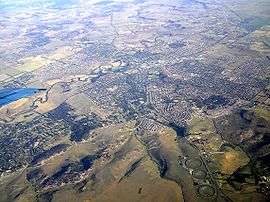 Aerial view of Sunbury, Victoria | |||||||||||||||
 Sunbury | |||||||||||||||
| Coordinates | 37°34′52″S 144°42′50″E | ||||||||||||||
| Population | 36,084 (2016)[1] | ||||||||||||||
| • Density | 1,633/km2 (4,229/sq mi) | ||||||||||||||
| Established | 1836 | ||||||||||||||
| Postcode(s) | 3429 | ||||||||||||||
| Elevation | 309 m (1,014 ft) | ||||||||||||||
| Area | 22.1 km2 (8.5 sq mi) | ||||||||||||||
| Location | 39 km (24 mi) from Melbourne | ||||||||||||||
| LGA(s) | City of Hume | ||||||||||||||
| State electorate(s) | Sunbury | ||||||||||||||
| Federal Division(s) | McEwen | ||||||||||||||
| |||||||||||||||
| |||||||||||||||
History
The Sunbury area has several important Aboriginal archaeological sites, including five earth rings, which were identified in the 1970s and 1980s, and believed to have been used for ceremonial gatherings. Records of corroborees and other large gatherings during early settlement attest to the importance of the area for Aboriginal people of the Wurundjeri tribe.[4][5][6]
Sunbury was first settled in 1836, by George Evans and William Jackson. It was Jackson and his brother, Samuel, who named the township Sunbury, after Sunbury-on-Thames, in Middlesex, England when it was established in 1857. The Post Office opened on 13 January 1858.[7]
Sunbury's connection with the history and development of Victoria is influential because of its most famous and powerful citizen, "Big" Clarke. In 1837, Clarke came to the area, and gained vast pastoral licences encompassing Sunbury, Clarkefield and Monegeetta.[8] His role as one of the biggest pastoralists in the colony, and his power and position within the Victorian Legislative Council, were highly significant in the early years of Victoria.
During the early decades of self-government in the Colony of Victoria, post 1851, there was a continual struggle in parliament, between the Legislative Assembly and the Legislative Council for ascendancy and the control of government. It was Council members, such as Clarke, who attempted to negate what they saw as the excesses of manhood suffrage, republicanism and Chartism, as embodied in the Assembly, in order to protect their own position.[9]
"Big" Clarke, as a member of the so-called bunyip aristocracy, also helped to frustrate legislative measures involving opening land to small farm selectors. Melbourne Punch depicted Clarke in anti-squatter cartoons, such as "The Man in Possession"[10] In 1859, "Big" Clarke was involved in a scandal around the discovery of gold on his holdings in Deep Creek. Shares in the Bolinda company soared and Clarke sold his shares at the peak of the rush, before the fraud was exposed. The gold assay was actually 'salted', possibly via a shotgun blast of golden pellets into the samples. Clarke claimed the rich assay was proved when washed in a soup bowl. The ever-barbed Melbourne Punch explained how the fraud worked in a cartoon of a chipped Chinese Willow Pattern plate titled "The Soup Plate".[11]
In 1874, Clarke's son, the future Sir William Clarke, 1st Baronet, built a mansion on an estate named "Rupertswood", after his own son, Rupert. The estate had access to a private railway station, which was mainly used to bring visitors to the property. Though the station was constructed in the late 19th century, the Clarkes did not pay the railways for its construction until the 1960s. (Rupertswood railway station was closed as a result of the Regional Fast Rail project and is now only a disused platform).[12] The Clarkes also had a connection to the Kelly Gang story via their police connection with Superintendent Hare.
The younger William was the president of the Melbourne Cricket Club, and it was through that position that the touring English cricket team came to spend the Christmas of 1882 at Rupertswood. On Christmas Eve, the English team played a social game of cricket against a local team. Lady Clarke took one or more bails, burnt them, and put the ashes in a small urn, wrapped in a red velvet bag, which she presented to the English Captain, Ivo Bligh.[13] She proposed that the ashes be used as a perpetual trophy for matches between the two countries. The Ashes has since become one of the world's most sought-after sporting trophies.
In 1922, the Clarke family sold the property to H V McKay, the owner of the Sunshine Harvester Works, who died in 1926. His estate sold the property in 1927 to the Salesian Catholic order. Until recently the mansion and surrounding property were used for educational and agricultural purposes, and as a boarding school for students undertaking both academic and agricultural endeavours. The school, known as Salesian College, Rupertswood, is still located on the property. The mansion has been restored, and is used for weddings and other formal functions.
In the early 1970s, the area, which was then still largely rural, became famous in Australia as the site of the Sunbury Pop Festival, which was held annually from 1972 to 1975.
Culture
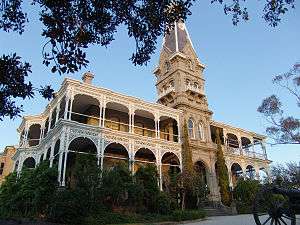
The demographics/culture of Sunbury up until the mid-1980s was predominantly White and some other minor ethnic groups. It has only been in the last 20 years that Sunbury has seen an increase of other nationalities (predominately from an immigration from New Zealand and the United Kingdom).
Sunbury's residents represent diverse cultural backgrounds, partly due to the working-class background, and proximity to major manufacturing and transport hubs, with Melbourne Airport only being 17.5 kilometres (11 mi) from the township. A recent trend for people who work in the Melbourne CBD to trade longer commute times for a more economic lifestyle (due to cheaper housing), has seen the population of Sunbury grow in number, with numerous new housing estates ringing the borders of the established township. Sunbury's population was recorded as being 25,086 in the 2001 census, and is estimated at approximately 34,000 in 2006, making it the 38th largest urban centre by population in Australia. Sunbury has a high Caucasian population.
Retail and entertainment
Sunbury has a town centre containing Jaycar Electronics, Calco Electrical, Coles, Woolworths, Foodworks and IGA supermarkets as well as Big W, Harris Scarfe and Target, Good Guys, Godfrey's department stores. Away from the town centre is an Aldi Supermarket, and Bunnings Warehouse hardware store. There are also many food outlets located in Sunbury such as Nando's, Vics Cuisine, Rocquette, Restaurant 77 and a variety of pizza restaurants, fish and chip shops and Asian restaurants. Sunbury also has many great little cafes to dine at such as The Spotted Owl, Sacco Coffee, cafe Circe and Mac's Lounge. Sunbury has a Reading Cinema, three Hotels and The Alley Sunbury nightclub, a 330-person capacity nightclub located 150 metres from the railway station and taxi hubs.
Transport
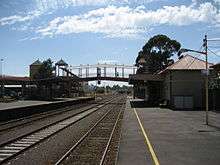
Sunbury Railway Station is connected by Metro services to Melbourne and by V/Line services on the Bendigo train line to both Melbourne and country Victoria. V/Line services are not as frequent as those on the metropolitan Metro service — an approximate hourly frequency is provided by V/Line on weekdays, although on weekends service levels can be as infrequent as once every 80 minutes.
The State Government electrified the tracks between Sunbury and Sydenham in a $270 million investment, bringing more frequent passenger services to the town - these Metro services started running on 18 November 2012.[14]
Education
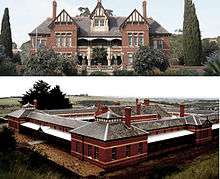
Primary schools
- Sunbury West Primary School
- Sunbury Primary School
- Sunbury Heights Primary School
- Killara Primary School
- Kismet Park Primary School
- St Anne's Primary School
- Our Lady of Mount Carmel Primary School
- Goonawarra Primary School
Secondary schools and high schools
- Sunbury Downs College (formerly Sunbury Post-primary School)
- Sunbury College (formerly Sunbury Secondary College, Sunbury High School)
- Salesian College
Others
- Sunbury and Macedon Ranges Special School
Sport
Sunbury is represented in the following sporting leagues:
Athletics
- Sunbury Little Athletics Centre Inc[15]
- Australian rules football
- Sunbury Football Club (Ballarat Football League)[16]
- Sunbury Kangaroos Junior Football Club (Riddell District Football League) – club official website
- Rupertswood Football Club (Victorian Amateur Football Association) – club official website
- East Sunbury Sporting Group - Seniors and juniors Football Club (Essendon District Football League) - club official website
- Bandy
- Australian Bandy League is based here.[17]
- Badminton
- Sunbury Badminton Club Inc
- Baseball
- Sunbury Titans Baseball club
- Basketball
- Sunbury Basketball Association
- Big V Basketball
- Bicycle
- Sunbury Bicycle User Group
- Cricket
- Sunbury Cricket Club,Clarke Oval
- Gisborne and District Cricket Association
- East Sunbury Cricket Club
- Ashfield Cricket Club
- Sunbury United Cricket Club
- Rupertswood Cricket Club
- Dancing
- Roselind Calisthenics
- Classique School Of Dance
- Flash Dance
- Sunbury school of Calisthenics
- Hotpink Dance Centre
- Shirley Rogers Academy of Dance
- Concept Performing Arts
- Girl Guides
- Sunbury Leadbeater Guides (Age 5–7 years)
- Sunbury Sugarglider Guides (Age 5–7 years)
- Sunbury Wongguri Guides (Age 7–11 years)
- Sunbury Kamballa Guides (Age 11–14 years)
- Sunbury Bluebell Guides (Age 14–17 years)
- Golf
- Golfers play at the course of the Goonawarra Golf Club at Francis Boulevard, Sunbury.[18]
- Sunbury Golf Range located just off Sunbury Road on the way to Melbourne Airport
- Horse riding
- Sunbury Pony Club
- Sunbury Riding Centre
- Lawn Bowls
- Royal Victorian Bowls Association - Metro
- Victorian Ladies' Bowls Association
- Rugby league
- Sunbury Tigers (Victorian Rugby League) – club official website
- Junior Side (Melbourne Junior Rugby League)
- Scouts Scouting in Sunbury has a long history and tradition with 1st sunbury existing continually for over fifty years
- 1st Sunbury Scout Group Joeys, Cubs, Scouts,
- 3rd Sunbury Scout Group Joeys, Cubs, Scouts,
- Koora Koora Cup (Sunbury) Venturer Unit (1st Sunbury Unit but incorporating 3rd Sunbury as well as 1st Diggers Rest)
- Wurundjeri Rover Crew (incorporating both 1st and 3rd Sunbury)
- Soccer
- Sunbury United (Victorian State League 2)
- Sunbury United Junior Football Club
- Softball
- Sunbury Softball Association
- Swimming
- Sunbury Amateur Swimming Club
- Aqua Wolves Swimming Club
- Table Tennis
- The Sunbury & District Table Tennis Association – club official website
- Tennis
- Sunbury Lawn Tennis Club
- Mt. Carmel Tennis Club
Historical books on Sunbury district and identities
- O'Brien, Antony. Shenanigans on the Ovens Goldfields: the 1859 election, Artillery Publishing, Hartwell, 2005. (details on the Bolinda Company gold scam and 'Big'Clarke's role in Upper House)
- Serle, Geoffrey. The Golden Age A History of the Colony of Victoria, 1851-1861, Melbourne University Press, Carlton, 1963. (gold, squatters and government)
- Spreadbrough Robert and Anderson, Hugh. Victorian Squatters, Red Rooster, Ascot Vale, 1983. (detailed maps of squatters runs in the district)
- Turner, Henry Giles, A History of the Colony of Victoria: from its discovery to its absorption in the Commonwealth of Australia, Vols 1 & 2, Melbourne, 1904.
Politics
Sunbury is represented by Cr Ann Potter, Cr Jack Ogilvie and Cr Steve (Jack) Medcraft in the Jacksons Creek Ward of the City of Hume. At State level, Sunbury is in the Electoral district of Sunbury, represented by Josh Bull . Federally, Sunbury is located in the Division of McEwen, represented by Rob Mitchell.
Notable people
- Mark Blicavs, Australian rules footballer
- Matthew Egan, Australian rules footballer
- Cameron Guthrie, Australian rules footballer
- Zach Guthrie, Australian rules footballer
- Mark Johnson, Australian rules footballer
- James Kelly, Australian rules footballer
- Jamie Maclaren, Australian Footballer, striker for Melbourne City FC, Hibernian F.C. and Australia
- Shirley McKerrow, Politician, first woman elected Federal President of any Australian political party[19][20]
- Nathan Phillips, Actor
- David Schwarz, Australian rules footballer
- Cassi Van Den Dungen, Model, runner-up in 2009 on Australia's Next Top Model
- Cameron Wight, Australian rules footballer
- James Sicily, Australian rules footballer
Location
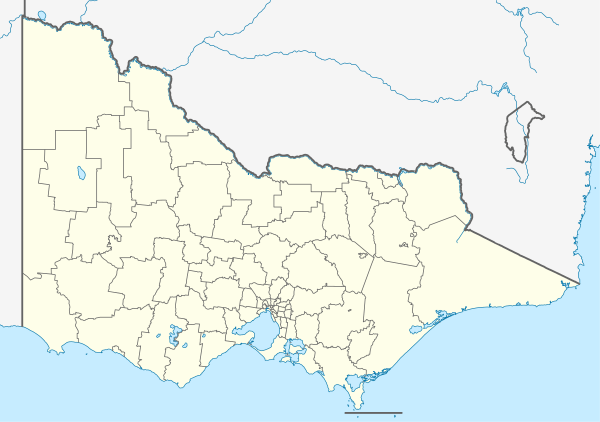
See also
- Shire of Bulla - A former local government area of which Sunbury was a part.
- Rupertswood
- Salesian College
- Sunbury Bus Service
- Sunbury Downs College
- Sunbury Industrial School
- Sunbury Lunatic Asylum
- Sunbury-on-Thames
- Sunbury Pop Festival
- Sunbury railway station
References
- Australian Bureau of Statistics (27 June 2017). "Sunbury (Urban Centre/Locality)". 2016 Census QuickStats. Retrieved 3 July 2017.

- Butler, Susan, ed. (2009). Macquarie Dictionary (5th ed.). Sydney: Macquarie Dictionary Publishers Pty Ltd. 1952 pages. ISBN 978-1-876-42966-9. Archived from the original on 12 January 2014.
- "Archived copy". Archived from the original on 6 July 2011. Retrieved 28 January 2010.CS1 maint: archived copy as title (link)
- Meyer Eidelson, The Melbourne Dreaming: A Guide to the Aboriginal Places of Melbourne, Aboriginal Studies Press, Canberra, (1997; 2000). ISBN 0-85575-306-4
- Bowdler, Sandra, 1999, A study of Indigenous ceremonial ("Bora") sites in eastern Australia, Centre for Archaeology, University of Western Australia, paper delivered at "Heritage Landscapes: Understanding Place &Communities" conference, Southern Cross University, Lismore, November 1999 Archived 14 April 2012 at the Wayback Machine
- Frankel, David 1982 Earth rings at Sunbury, Victoria. Archaeology in Oceania 17: 83-89.
- Premier Postal History, Post Office List, retrieved 11 April 2008
- Spreadbrough, Victorian Squatters
- Serle,The Golden Age, pp.146–150
- Punch, 2 December 1858, p.149
- Punch 9 February 1860, p. 21 see also O'Brien, Shenanigans, Ch. 3 for an insight and cartoons of the 1850s, see also M. Clarke, "Big" Clarke for a comprehensive family history
- M. Clarke, "Big" Clarke
- The Times (London), 27 June 1930. page 7.
- "Sunbury Electrification Project Overview". Victorian State Government Department of Transport. Archived from the original on 28 March 2011. Retrieved 25 June 2011.
- "Sunbury Little Athletics". www.sunburylac.org.au. Archived from the original on 17 March 2018. Retrieved 24 April 2018.
- Full Points Footy, Sunbury, archived from the original on 9 March 2009, retrieved 15 April 2009
- "Members". worldbandy.com. Archived from the original on 16 October 2013. Retrieved 24 April 2018.
- Golf Select, Goonawarra, archived from the original on 24 September 2009, retrieved 11 May 2009
- Lofthouse, Andrea (1982). Who's Who of Australian Women. Methuen Australia.
- "Distinguished Women in The Nationals". Archived from the original on 25 April 2013. Retrieved 24 February 2013.